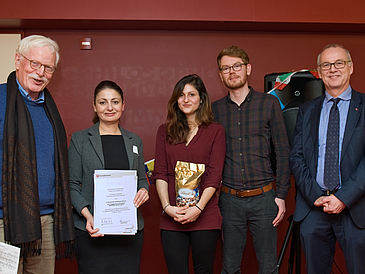For the past five months they have been untiringly organizing language courses, programs of sport, art projects, and various events held for refugees on the campus. For their hard work and dedication the student project group “Refugees Welcome” has now received a well-earned reward. This is the first time that the University of Bremen, supported by the “unifreunden” society for friends of the University, has awarded a prize in recognition of active citizenship. During a press conference held to mark the occasion, University Rector Bernd Scholz-Reiter used the words “unique and admirable” to describe the engagement and dedication shared by the group of 20 students, commenting further: “This is the first time a voluntary active citizenship project of this magnitude has been undertake at our University”. The award comes with prize money in an amount of 1,000 euros.
Rector Bernd Scholz-Reiter and Prof. Bengt Beutler from unifreunden presented the prize certificate in the festive atmosphere of the Christmas Jamboree organized by the International Office. While expressing his gratitude to the students, Beutler pointed out: “Such active citizenship provides an excellent example of an excellent university and student body. And it is a role model for Europe, for in order to maintain thriving development we need this kind of active citizenship on an international level”. The student group’s representatives were naturally happy to receive the prize, saying it spurs them on and gives them the motivation to carry on with the good work.
“From the beginning we wanted our efforts to be sustainable”, says the spokesperson for the group, Sevda Atik. “We are proud of what we have achieved – but now the academic year has started we often find ourselves coming up against our limits.” The group says it welcomes the encouragement and support it receives from the good cooperation with the University management, the Faculties, the Islamic University Association, and the “many well-wishing sponsors in the University”.
“I can’t simply stop now”
Tarik Nissen, responsible for sport in the “Refugees Welcome” project, is particularly grateful for the support he receives from the University Sport Association. “We are now able to offer six soccer matches a week for unaccompanied underage refugees on a regular basis“, he says. The players are no longer accommodated in the tent adjacent to the drop tower because it was clearly unsuitable for winter conditions. They now travel the considerable distance from the suburbs of Hastedt, Neustadt, and Stephaniviertel to reach the campus. The University Sport Association has even made it possible for the refugees to book a regular time slot in the sports hall. “Everything’s running very smoothly.” And although he is under pressure to resit an exam, he still doesn’t want to give up his voluntary work. “Even though it’s a lot of work, I can’t simply stop now.” Tim Engel, who organizes German courses, is making a similar experience. “The University and some of the institutes have allocated rooms and set times for classes. You can say we have now institutionalized the courses.” And he says how gratifying it is to see “how so many of the refugees make such amazingly fast progress”. Samira Alssaedi, responsible for cultural activities, reports her experience of art projects, drama groups, and choir singing. “We have built up really good relations with the young refugees”, she says.
Soccer tournaments and culture café: Planned new activities
The award has spurred the project group on to new endeavors. For instance, if Sevda Atik gets her way there will be more offers designed especially for women: Fitness courses, self-defense, and sport for mother and child. “We are starting project days with refugees in cooperation with the sixth class of a Bremen school.” And in the run-up to Christmas, the project group is hastily organizing a large-scale soccer tournament. There are even plans for a culture café. For all the enthusiasm and recognition surrounding these activities, Tom Robin Hoffmann, spokesperson for the work group “Grenzen töten” [Eliminate borders] and also a member of the project group “Refugees Welcome”, says on a more critical note: “It’s actually rather problematic that we should have to engage in such activities at all“, he says in reference to the lack of government action. “Our thoughts are with the people who are unable to set out on the long journey here, and we are very anxious about how things will develop politically.”
University management working on a concept
Yasemin Karakaşoğlu, the University’s Vice Rector for International Affairs and Diversity, couldn’t agree more – pointing out that the University management is pulling political strings in an attempt to organize more support from the State of Bremen and the Federal Government. “We are currently working on a concept.“ Refugees taking part in the IN Touch project, for instance, must be brought to the language level C1 before they are fit for university studies. Full of praise for the project group she says, “We really appreciate your flexible approach and everything you do to help the refugees. We don’t intend to lean back and let you get on with it, though. We will do everything in our power to exert pressure on the politicians.“
For further information, please contact:
AG Refugees Welcome
Facebook: https://www.facebook.com/RefugeesWelcomeUniBremen/timeline

